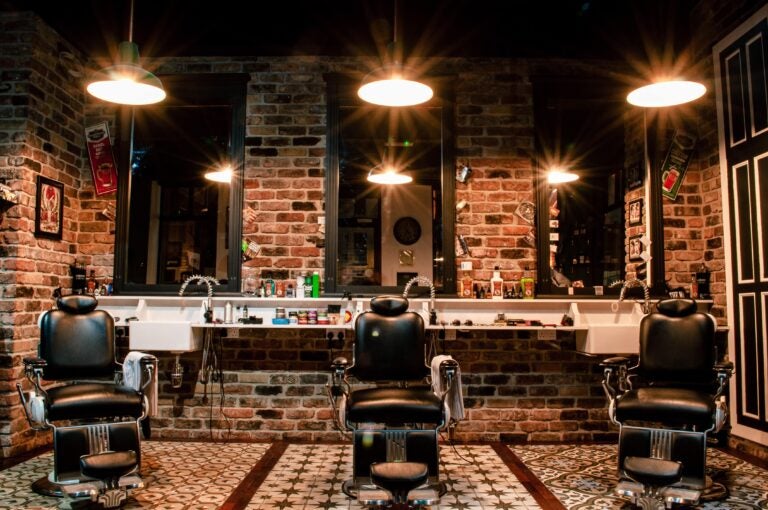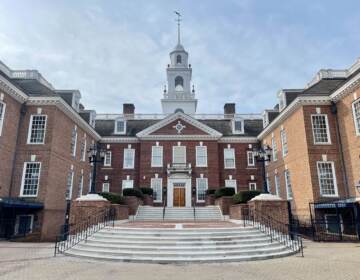Getting professional licenses is about to get easier for Pa. residents with criminal records
Gov. Tom Wolf is expected to sign a bill this week advocates say will help people with criminal records get better jobs by obtaining professional licenses.

Advocates say the bill will help people with criminal records get better-paying jobs by obtaining professional licenses, such as those required for barbers, cosmetologists and real estate agents. (Nathon Oski/Unsplash)
Tanisha remembers exactly what she told a Delaware County police officer the day she was arrested outside of her ex-boyfriend’s home in 2008.
“This could potentially ruin my life.”
She wasn’t exaggerating. In the decade since she was charged with simple assault and resisting arrest, the 32-year-old has struggled to find steady work because of her criminal record, making it difficult to provide for herself and her son, who’s now a teenager.
“I couldn’t even get a cashier’s job,” said Tanisha. WHYY News has agreed to withhold her last name to avoid undermining her legal effort to put her criminal past behind her.
Two years ago, while working an office job she got through a temp agency, Tanisha decided to apply to nursing school. She had an associate’s degree in business management, but had developed a passion for health care while helping her grandmother manage life with a degenerative form of dementia.
However, Tanisha’s criminal record meant the state could reject her application for the license needed to practice nursing in Pennsylvania, potentially making going back to school a big waste of time and money.
“It was disheartening,” she said.
Enter Senate Bill 637, a measure recently passed by the General Assembly now poised to become law this week. Gov. Tom Wolf is expected to sign the bill as soon as Wednesday.
Under the bill, people with criminal records seeking any occupational license can only be rejected if their conviction “directly relates” to the practice of the profession, or if the crime represents a “substantial risk” to coworkers and customers, such as if a home health aide was previously convicted of assaulting a patient.
The measure would also allow the state to grant licenses on a conditional basis, meaning people would be required to work under supervision until it’s deemed unnecessary by the relevant licensing board.
The bill applies to the nursing license Tanisha would need, but also those required for barbers, cosmetologists, real estate agents, engineers, funeral directors and dozens of other professions.
“This really opens up a lot of opportunities for people with records who are looking to become their own boss,” said Sharon Dietrich, litigation director at Community Legal Services, a Philadelphia-based legal aid group.
The current law allows the state to deny people licenses if they have a felony conviction, or if the licensing board deems they lack “good moral character.” The vague terminology bakes a certain degree of subjectivity into the application process, which has caused many residents with criminal backgrounds to be denied licenses. The “good moral character” clause is required by 23 of the state’s 29 licensing boards, including those for cosmetologists, but not for barbers.
Under the new measure, that language cannot be grounds for rejecting an applicant with a criminal record, though it’s possible it could be applied to people with a past the board deems otherwise problematic, said Dietrich.
It’s unclear how many Pennsylvania residents could benefit from the change. The state does not keep statistics on how many people are denied occupational licenses because of their criminal records, according to a spokesperson for the Department of State, which oversees the boards and commissions comprising the Bureau of Professional and Occupational Affairs.
A task force report released in 2018 found that roughly 1 in 5 Pennsylvania workers are professionally licensed, with nurses and dietitians occupying the biggest segment of the pie chart.
These days, Louis Maye is a full-time political consultant in Philadelphia. But for years after he was released from state prison, the 54-year-old fixed computers and cut hair out of his basement in Germantown.
Maye learned both skills while incarcerated at SCI Huntingdon in central Pennsylvania. They were life-savers, providing enough income to get by after spending 21 years behind bars for armed robbery.
“I was able to do OK,” said Maye, who got his state barber license in 2009 through a program offered by the prison.

Get daily updates from WHYY News!
Maye is still a licensed barber, and though he doesn’t plan to go back to cutting hair anytime soon, he’s comforted knowing that he can if he ever needs the money. And he’s happy that others like him will have a real shot at having a career they can carry with them the rest of their lives.
“That’s always a plus in society — period. Not just for ex-offenders,” said Maye.
Tanisha sees a real second chance in the new bill.
She was arrested when she was a 20-year-old single mother attending Peirce College. She had never been in trouble with the law before that and hasn’t been since.
She pled guilty to simple assault after she tried to break away from the Upper Darby police officer who was arresting her, allegedly for striking her ex-boyfriend with a security device that locks onto steering wheels to prevent car theft.
“I was startled. I didn’t expect them to arrest me,” said Tanisha.
Her dream of becoming a nurse was delayed, but not destroyed.
“I enjoy business, but it’s a certain joy that you get in your heart and in your soul when you’re actually helping out your fellow man,” said Tanisha. “It just makes me a lot more fulfilled.”
 WHYY is one of over 20 news organizations producing Broke in Philly, a collaborative reporting project on solutions to poverty and the city’s push towards economic justice. Follow us at @BrokeInPhilly.
WHYY is one of over 20 news organizations producing Broke in Philly, a collaborative reporting project on solutions to poverty and the city’s push towards economic justice. Follow us at @BrokeInPhilly.
WHYY is your source for fact-based, in-depth journalism and information. As a nonprofit organization, we rely on financial support from readers like you. Please give today.






